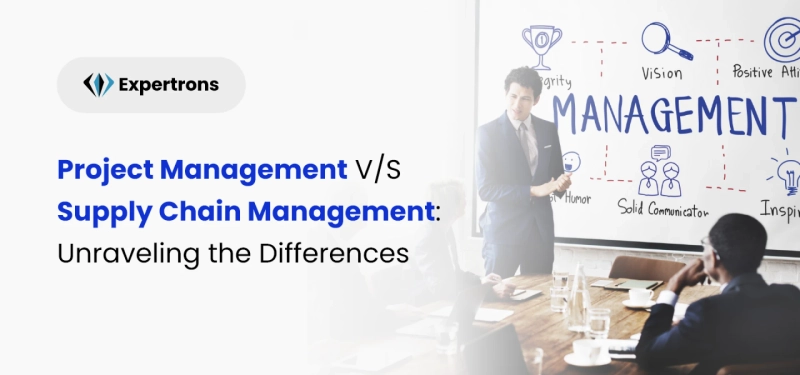Exploring the Key Differences: Project Management vs Supply Chain Management
Table of Contents
IntroductionDefinition and Scope Objectives and DeliverablesKey Skill Sets
Introduction
When it comes to business management, two crucial areas that require effective handling are the supply chain and projects. While both supply chain management and project management play vital roles within an organization, there is often confusion regarding their distinctions.
Today we will learn what is a supply chain, the nuances of project management vs supply chain management, highlighting their differences and shedding light on how they contribute to the success of businesses.
Definition and Scope
Project Management
When it comes to project management vs supply chain management, project management involves planning, organizing, and controlling resources to achieve specific goals within a defined timeframe. It focuses on initiating, planning, executing, monitoring, and closing projects. Project managers coordinate tasks, manage stakeholders, allocate resources, and mitigate risks throughout the project lifecycle.Supply Chain Management
Supply chain management encompasses coordinating and optimizing activities involved in procuring, producing, and distributing goods and services. It involves the seamless flow of raw materials, intermediate products, and finished goods from suppliers to manufacturers, distributors, retailers, and ultimately to customers. Supply chain managers oversee sourcing, logistics, inventory management, demand forecasting, and customer satisfaction. Warehouse supply logistics involves strategically managing and coordinating resources, inventory, and transportation to ensure the smooth flow of goods within a warehouse facility.Timeframe and Duration
Project Management
When it comes to project management vs supply chain management, projects have specific start and end dates, well-defined deliverables, and objectives. Project management focuses on completing tasks within a predetermined timeframe and budget. It involves breaking down the project into manageable phases and milestones, ensuring progress and deadlines are tracked.Unlike projects, supply chains are ongoing and operate continuously to support the flow of goods and services.Supply Chain Management
Supply chain management aims to create an efficient and sustainable network that enables the timely and cost-effective delivery of products to customers. It involves constant monitoring, optimization, and adaptation to market dynamics, demand fluctuations, and changes in supplier capabilities.Objectives and Deliverables
Project Management
The primary objective of project management is to achieve specific goals and deliverables within the project’s scope, budget, and timeline. Projects often involve unique endeavors, such as developing a new product, implementing a system, or constructing a building. Project managers focus on delivering quality results while managing constraints and stakeholder expectations.Supply Chain Management
The core objective of supply chain management is to ensure the availability of products or services to meet customer demand efficiently. This involves optimizing the flow of goods, minimizing inventory costs, reducing lead times, and enhancing customer satisfaction. Supply chain managers strive to create resilient and agile supply chains that can quickly respond to market changes and deliver value to customers.Key Skill Sets
Project Management
When it comes to project management vs supply chain management, Project managers need strong leadership, communication, and organizational skills. They must effectively collaborate with diverse stakeholders, manage conflicts, and make informed decisions under pressure. Additionally, project managers must thoroughly understand project management methodologies, risk assessment, budgeting, and scheduling techniques.Supply Chain Management
Supply chain managers require a broad set of skills, including strategic planning, negotiation, supplier relationship management, and data analysis. They need to analyze market trends, forecast demand, optimize inventory levels, and implement efficient logistics strategies. Strong communication and problem-solving abilities are essential for coordinating activities across different partners in the supply chain.Conclusion
When comparing project management vs supply chain management, it is important to understand the fundamental differences as these play a pivotal role in achieving organizational success.
While project management focuses on executing temporary endeavours within a defined timeframe, supply chain management ensures the seamless flow of products and services to meet customer demand continuously.
Both disciplines require distinct skill sets and approaches to overcome challenges and deliver desired outcomes.
By understanding logistics and supply chain management, businesses can effectively allocate resources, optimize processes, and drive efficiency throughout their operations.



